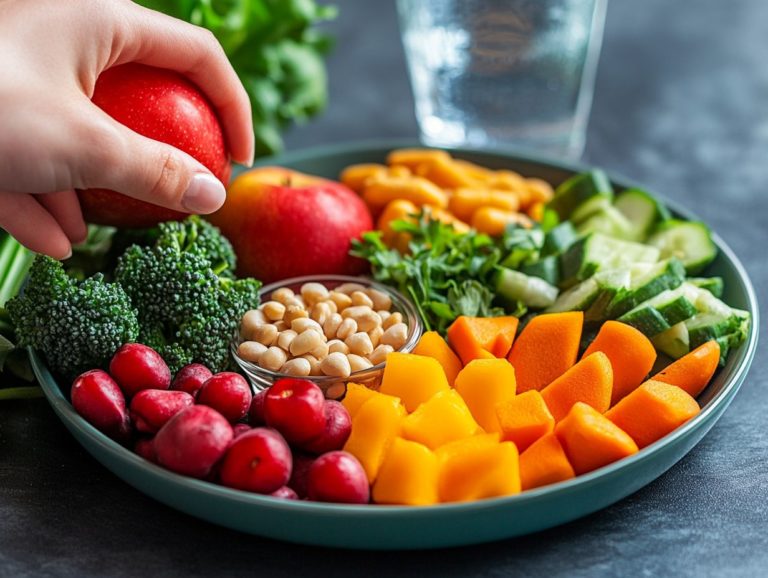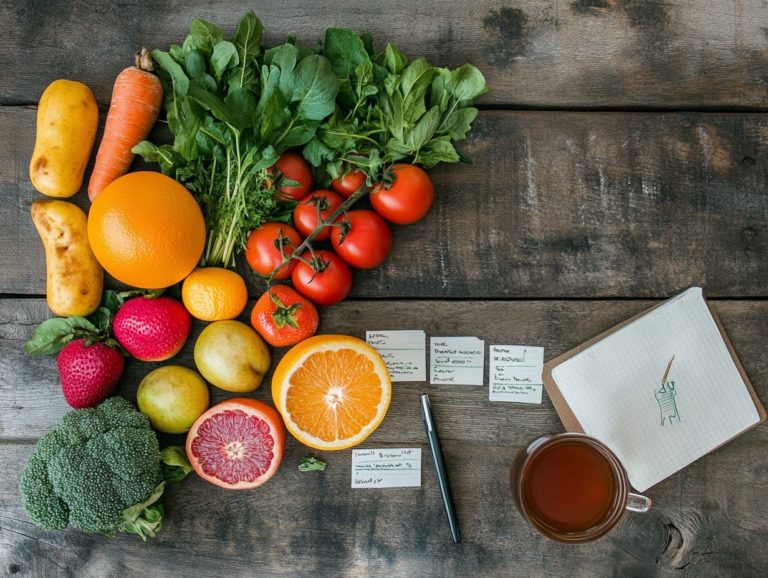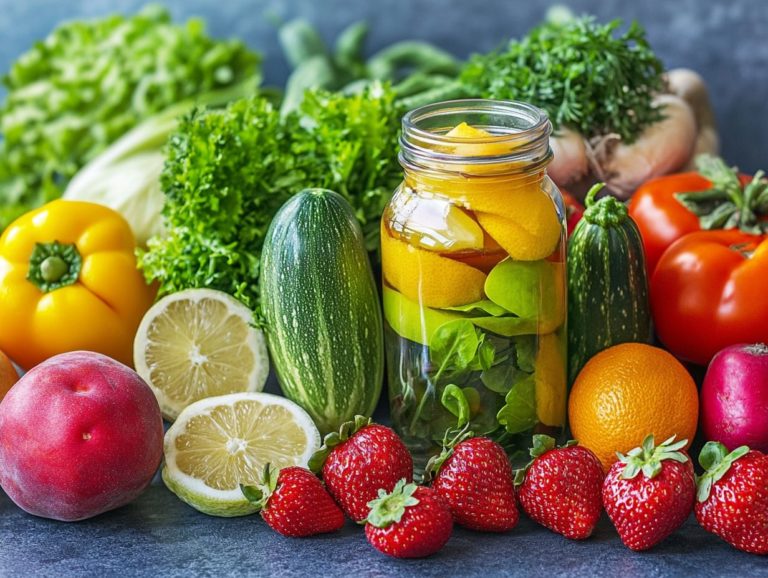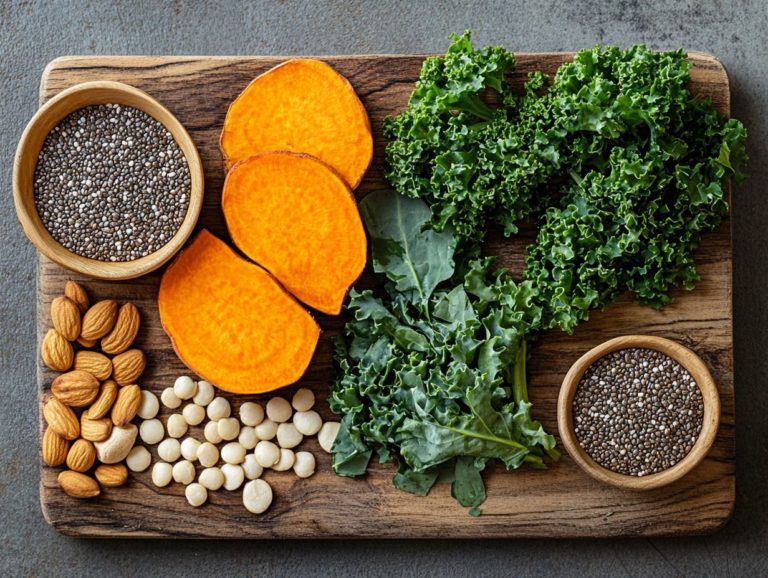10 Ways to Enhance Your Nutritional Intake
Eating well goes beyond just being a trend; it s an essential cornerstone of a healthy, fulfilling life.
In a world brimming with information, navigating the complexities of nutrition can feel daunting.
This article presents ten straightforward strategies to elevate your dietary habits. These range from incorporating a diverse array of fruits and vegetables to opting for healthier snack choices.
You will also learn about key nutrients, common deficiencies, and practical tips for effective meal planning.
Get ready to kickstart your journey to better health! Dive in!
Contents
- Key Takeaways:
- 1. Eat a Variety of Fruits and Vegetables
- 2. Choose Whole Grains over Refined Grains
- 3. Incorporate Lean Protein Sources into Your Diet
- 4. Add Healthy Fats to Your Meals
- 5. Limit Processed and High-Fat Foods
- 6. Consume Low-Fat Dairy Products
- 7. Stay Hydrated with Water
- 8. Avoid Sugary Drinks
- 9. Use Herbs and Spices to Add Flavor
- 10. Choose Healthy Snack Options
- How Can You Make Sure You Are Getting Enough Nutrients?
- What Are the Key Nutrients Your Body Needs?
- How Can You Add More Nutrient-Dense Foods to Your Diet?
- What Are Some Common Nutrient Deficiencies and How Can You Address Them?
- What Are Some Tips for Meal Planning to Ensure Adequate Nutritional Intake?
- How Can You Make Healthy Eating Sustainable for the Long-Term?
- Preguntas Frecuentes
- Cu les son algunas maneras de mejorar mi ingesta nutricional?
- Pueden los suplementos ayudar a mejorar mi ingesta nutricional?
- Hay alimentos espec ficos que pueden ayudar a aumentar mi ingesta nutricional?
- Es importante rastrear mi ingesta diaria de nutrientes?
- C mo puedo incorporar m s fibra en mi dieta para mejorar mi ingesta nutricional?
- Reducir mi ingesta de alimentos procesados y ricos en grasas realmente puede hacer una diferencia en mi nutrici n general?
Key Takeaways:

1. Variety is key: Incorporate a variety of fruits and vegetables into your meals to ensure you get a range of essential vitamins and minerals.
2. Choose whole grains: Opt for whole grains over refined grains to increase your intake of fiber, vitamins, and minerals.
3. Lean protein is important: Include lean protein sources such as chicken, fish, and legumes to support muscle growth and repair.
4. Add healthy fats: Incorporate healthy fats from sources like avocado and nuts to support heart health and nutrient absorption.
5. Say no to processed foods: These foods are often low in nutrients and high in unhealthy ingredients.
6. Choose low-fat dairy: Opt for low-fat dairy products such as skim milk and Greek yogurt to get essential nutrients while keeping your saturated fat intake in check.
7. Stay hydrated: Drink plenty of water throughout the day to stay hydrated and support proper digestion and nutrient absorption.
8. Avoid sugary drinks: Limit your intake of sugary drinks; they provide empty calories and can lead to weight gain and other health issues.
9. Use herbs and spices: Add flavor to your meals with herbs and spices instead of relying on unhealthy sauces and seasonings.
10. Choose healthy snacks for a boost your body will thank you! Snack on nutrient-dense options like fruits, vegetables, and nuts instead of processed snacks to boost your overall nutritional intake.
1. Eat a Variety of Fruits and Vegetables
Eating a diverse array of fruits and vegetables elevates your meals and supplies essential nutrients that are crucial for your overall health and well-being.
This colorful bounty helps fend off chronic diseases like heart disease and type 2 diabetes while bolstering your immune system with vital antioxidants and vitamins A and C.
Take leafy greens like spinach and kale, for example; they are abundant in iron and vitamin K, which are essential for maintaining healthy blood and bone function.
Then there are vibrant bell peppers and carrots, which deliver beta-carotene key for sustaining eye health.
Fruits such as blueberries and oranges provide flavonoids and vitamin C, respectively, which can enhance cognitive function and skin health.
By incorporating a rainbow of produce into your diet, you not only diversify your nutrient intake but also improve nutrient absorption.
Each color signifies distinct phytochemicals natural compounds found in plants that help keep you healthy that work in harmony within your body, ultimately boosting your vitality and well-being.
2. Choose Whole Grains over Refined Grains
Opt for whole grains instead of refined grains to maximize nutrient absorption and gain numerous health benefits.
Whole grains are rich in fiber, vitamins, and minerals that help you maintain a healthy weight and reduce the risk of chronic diseases.
Take whole wheat bread, for example; it is a nutrient-dense option that offers a satisfying way to increase your dietary fiber intake.
In contrast, its refined counterpart often lacks essential nutrients.
When choosing rice, brown rice stands out as a true powerhouse, packed with antioxidants and vital minerals, while white rice loses beneficial outer layers during processing.
By making these simple substitutions, you can enhance your overall diet and improve your digestive health, ultimately working to prevent issues like obesity, heart disease, and type 2 diabetes.
Prioritizing whole grains lays the groundwork for sustainable long-term wellness.
3. Incorporate Lean Protein Sources into Your Diet
Incorporating lean protein sources like Greek yogurt, eggs, and lean meats into your diet is essential for maintaining muscle mass, boosting metabolism, and enjoying a range of health benefits.
These protein-rich options are incredibly versatile and packed with essential nutrients that aid in muscle recovery after exercise.
Take Greek yogurt, for example; it s creamy and perfect for smoothies or as a delightful snack paired with fresh fruits.
Eggs are celebrated for their high protein content and amino acids. You can scramble them, poach them, or whip them into a vibrant vegetable omelet ideal for breakfast or any meal.
Lean meats like chicken or turkey are fantastic choices as well. Grill or bake them, and toss them into salads or wraps for a satisfying protein boost that supports weight management and keeps hunger at bay.
4. Add Healthy Fats to Your Meals
Adding healthy fats, like heart-friendly oils and omega-3 supplements, enhances the nutritional value of your meals and supports better heart health, brain function, and overall wellness.
Embrace a variety of sources, including avocados, nuts, and seeds, for numerous benefits. Avocados are packed with monounsaturated fats that help lower bad cholesterol levels while aiding in the absorption of fat-soluble vitamins like A, D, E, and K.
Nuts, especially walnuts and almonds, are rich in essential fatty acids and antioxidants that combat inflammation and promote brain health.
Diversifying your fat intake with these nutrient-dense choices can significantly elevate your overall health, resulting in improved energy levels and a robust immune system.
5. Limit Processed and High-Fat Foods
Limiting processed and high-fat foods is crucial for optimal nutrition and minimizing nutrient deficiencies. These foods often contain added sugars and unhealthy fats, which can lead to chronic diseases.
Overindulging in such foods has been linked to rising obesity rates, highlighting a significant public health concern. Processed foods can disrupt your metabolism, making you more susceptible to conditions like type 2 diabetes.
Swap these items for whole grains, fresh fruits, and vibrant vegetables to nourish your body effectively while keeping your weight in check. Choosing homemade meals crafted with wholesome ingredients promotes better health outcomes and enhances your overall well-being.
6. Consume Low-Fat Dairy Products
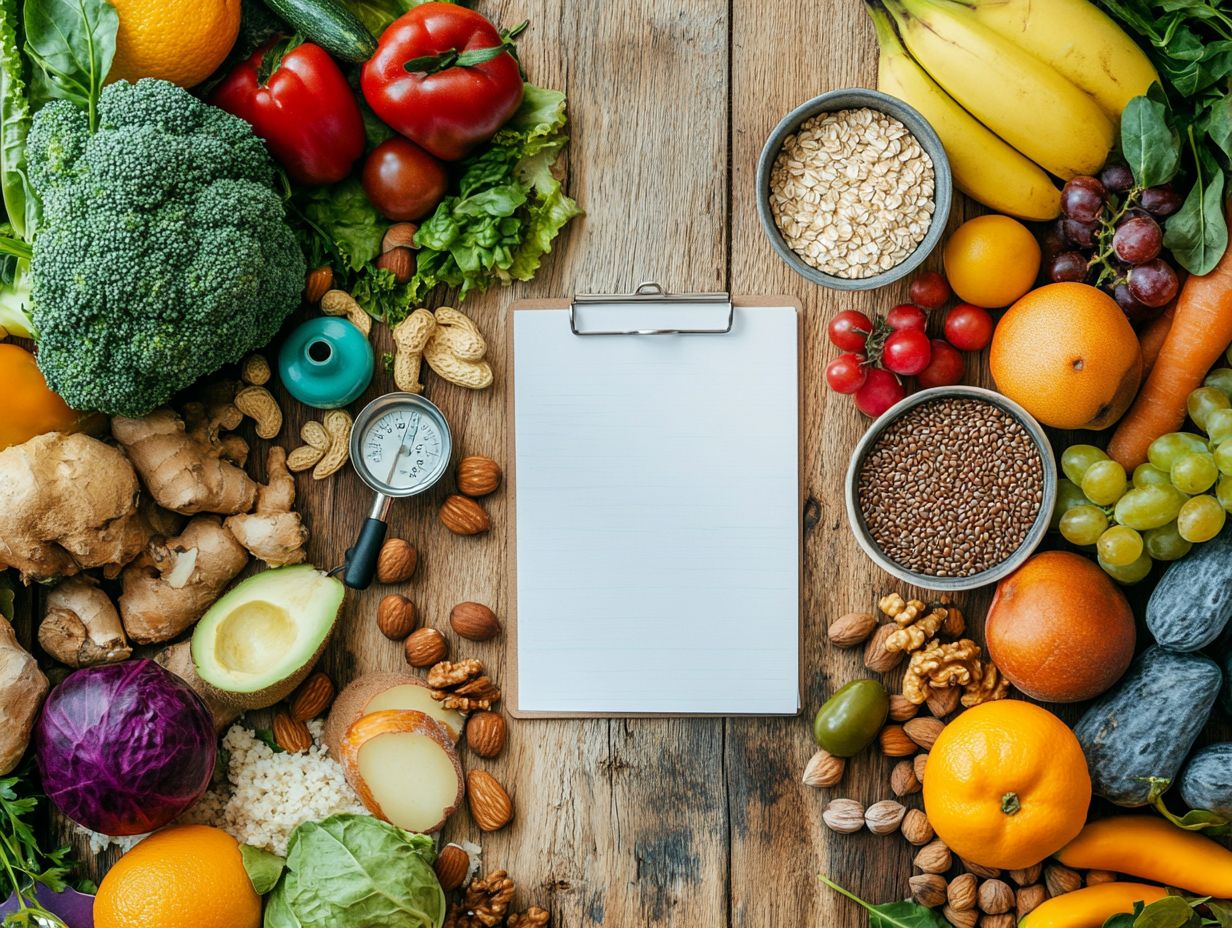
Low-fat dairy products, like Greek yogurt and skim milk, provide essential nutrients such as calcium and vitamin D, which are vital for strong bones and overall health.
These products typically contain fewer calories and less saturated fat than full-fat options, making them excellent choices for managing your weight without sacrificing flavor or nutrition.
Incorporating them into your balanced diet ensures you get protein that aids in muscle repair and growth.
If you have food intolerances, lactose-free alternatives are available, allowing you to enjoy vital nutrients without discomfort.
Low-fat dairy can be a fantastic part of your meals whether you’re blending up smoothies, tossing together salads, or indulging in baking.
7. Stay Hydrated with Water
Stay hydrated! Drinking enough water is essential for nutrient absorption, optimal body functions, and maintaining a healthy metabolism. Even mild dehydration can diminish both physical and cognitive performance, which is something to avoid.
It s generally recommended to consume about 8 to 10 cups (or roughly 2 to 2.5 liters) of water each day, though this can vary based on your activity levels and climate.
Munch on fruits and vegetables with high water content, such as cucumbers and watermelon, to contribute to your daily fluid intake.
Keep a reusable water bottle within reach throughout the day as a reminder to sip regularly. Swapping sugary drinks for water can also significantly cut your calorie intake while improving hydration.
8. Avoid Sugary Drinks
Avoiding sugary drinks is essential for preventing chronic diseases like obesity and type 2 diabetes. It also promotes better overall health through more nutritious beverage choices.
The high sugar content in these drinks contributes to unwanted weight gain and disrupts how your body uses food for energy, potentially leading to insulin resistance and various health issues.
Regularly indulging in sugary sodas and energy drinks increases your risk of developing fatty liver and cardiovascular problems.
Instead of reaching for sugary options, refresh your day with these tasty alternatives:
- Sparkling water infused with fresh fruit
- Soothing herbal teas
These choices keep you hydrated without the extra calories and offer various health benefits, making it easier to cultivate a more health-conscious lifestyle.
9. Use Herbs and Spices to Add Flavor
Using herbs and spices elevates the flavor of your meals and enhances the nutrients in your food. They also provide health benefits due to their antioxidant properties and help reduce reliance on salt and sugar.
Take basil and oregano, for example. They infuse your pasta dishes with vibrant flavors and bring anti-inflammatory effects to the table.
Turmeric, with its warm, earthy undertones, transforms your curries and soups, promoting better digestion and joint health.
Then there’s cinnamon a sweet spice that works wonders in both savory and sweet dishes. It s renowned for helping regulate blood sugar levels.
By incorporating these aromatic ingredients into your cooking, you ll elevate the taste profile of your meals and turn them into powerhouses of beneficial compounds that bolster your wellness.
10. Choose Healthy Snack Options
Opting for healthy snack choices, like fresh fruits and nuts, helps curb those pesky cravings while delivering essential nutrients and boosting your energy levels throughout the day.
These nutritious selections not only satisfy your hunger but also come with added perks. Almonds are packed with vitamin E and healthy fats, while berries brim with antioxidants that promote overall well-being.
To simplify your snacking routine, prepare individual servings in advance perhaps by portioning out nuts into small bags or slicing up fruit and storing it in the refrigerator.
By planning ahead, you can easily resist the allure of processed snacks and relish wholesome alternatives that nourish both your body and mind.
How Can You Make Sure You Are Getting Enough Nutrients?
Ensuring you re getting enough nutrients is essential for good nutrition. You can achieve this through thoughtful meal planning, scrutinizing labels, and being aware of potential nutrient deficiencies from poor dietary choices.
Understanding your dietary needs goes beyond counting calories; it involves recognizing the specific vitamins and minerals your body craves for optimal health.
Learn to identify signs of nutrient deficiencies like fatigue or immune system troubles that could indicate an imbalance in your diet. Nutrient absorption is also vital for overall health.
Even if you re consuming adequate amounts of a nutrient, your body might struggle to absorb it effectively due to factors like gut health or medications.
By prioritizing a well-rounded nutritional approach, you can foster a healthier lifestyle and elevate your well-being.
What Are the Key Nutrients Your Body Needs?

The key nutrients your body requires include proteins, healthy fats, vitamins, and minerals, each playing a distinctive role in maintaining health and preventing deficiencies.
Proteins are essential building blocks for your cells, crucial for muscle repair and growth. You can find them in sources like lean meats, legumes, and dairy products.
Healthy fats, sourced from avocados, nuts, and olive oil, support brain health and hormone production.
Vitamins from vitamin C in citrus fruits to B-complex vitamins in whole grains are critical for immune function and energy metabolism.
Minerals, such as calcium from dairy and iron from leafy greens, contribute to bone strength and oxygen transport in your blood. This highlights the importance of maintaining a well-rounded diet.
How Can You Add More Nutrient-Dense Foods to Your Diet?
Adding more nutrient-dense foods to your diet is achievable through smart meal planning and diverse cooking methods.
Start with a weekly menu featuring whole grains like quinoa or brown rice, complemented by colorful fruits and vegetables. This strategy not only makes meals appealing but also delivers a variety of nutrients.
Experiment with different cooking methods. Steaming and roasting can enhance flavors and increase nutritional benefits.
Snacking on raw veggies or fresh fruit is a great way to boost your nutrient intake without feeling deprived. This simple strategy helps you meet your dietary goals.
What Are Some Common Nutrient Deficiencies and How Can You Address Them?
Common nutrient deficiencies, such as iron, vitamin D, and omega-3, can be effectively managed through dietary adjustments and awareness of food intolerances.
For example, iron deficiency often arises from insufficient intake or increased physical demands, leading to fatigue and weakness. Vitamin D deficiency can result from limited sun exposure, potentially causing bone pain and muscle weakness.
If you re not eating enough fish, omega-3 deficiency may lead to cognitive decline and cardiovascular issues. Incorporate iron-rich foods like leafy greens and legumes, ensure safe sun exposure, and increase your intake of fatty fish or flaxseed to combat these deficiencies.
Consulting with healthcare professionals for personalized supplementation is also important for optimal health.
What Are Some Tips for Meal Planning to Ensure Adequate Nutritional Intake?
Smart meal planning keeps you on the path to better health! It involves strategic grocery shopping, cooking at home, and prioritizing healthy foods tailored to your dietary needs.
Start by reviewing what ingredients you have and deciding on meals for the week. A balanced grocery list helps you stay organized and focused.
Incorporate a variety of food groups such as lean proteins, whole grains, and colorful fruits and vegetables to achieve a well-rounded diet.
Preparing meals in advance can save time and reduce stress during busy weekdays. Set aside a few hours each week for meal prep.
Don t hesitate to explore new recipes; they make meal planning fresh and exciting, helping you enjoy healthy eating.
How Can You Make Healthy Eating Sustainable for the Long-Term?
Making healthy eating sustainable hinges on embracing solid nutrition practices and crafting a lifestyle that values balanced meals.
Implement portion control to prevent overeating while enjoying a diverse range of foods.
Mindful eating techniques can enhance your experience by sharpening your awareness of hunger cues and food satisfaction, guiding you toward better choices.
Regular physical activity supports weight maintenance and contributes to overall well-being, making it easier to stick to healthier habits. By weaving these practices into your routine, you establish a strong foundation for lasting health.
Preguntas Frecuentes
Cu les son algunas maneras de mejorar mi ingesta nutricional?

Algunas maneras de mejorar tu ingesta nutricional incluyen comer una variedad de frutas y verduras, agregar prote nas magras, elegir granos enteros y limitar los alimentos procesados y ricos en grasas.
Start your journey to better nutrition now! Make one change today!
Pueden los suplementos ayudar a mejorar mi ingesta nutricional?
Los suplementos pueden ser tiles para quienes tienen deficiencias espec ficas de nutrientes. Sin embargo, siempre es mejor obtener tus nutrientes de alimentos integrales. Consulta a un profesional de la salud antes de comenzar cualquier suplemento nuevo.
Hay alimentos espec ficos que pueden ayudar a aumentar mi ingesta nutricional?
S ! Hay muchos alimentos ricos en nutrientes que son excelentes para mejorar tu ingesta nutricional. Ejemplos son las verduras de hoja verde, el salm n, las nueces, las semillas y las legumbres.
Es importante rastrear mi ingesta diaria de nutrientes?
Puedes beneficiarte de rastrear tu ingesta de nutrientes. Esto te ayuda a asegurarte de que obtienes suficientes nutrientes esenciales y a identificar cualquier posible deficiencia.
C mo puedo incorporar m s fibra en mi dieta para mejorar mi ingesta nutricional?
Aumenta tu ingesta de fibra agregando granos enteros, frutas y verduras a tus comidas. Opta tambi n por refrigerios ricos en fibra, como nueces, semillas o galletas de granos enteros.
Reducir mi ingesta de alimentos procesados y ricos en grasas realmente puede hacer una diferencia en mi nutrici n general?
Definitivamente! Limitar los alimentos procesados y altos en grasa puede hacer una gran diferencia. Al enfocarte en opciones integrales y ricas en nutrientes, mejorar s significativamente tu salud nutricional.

